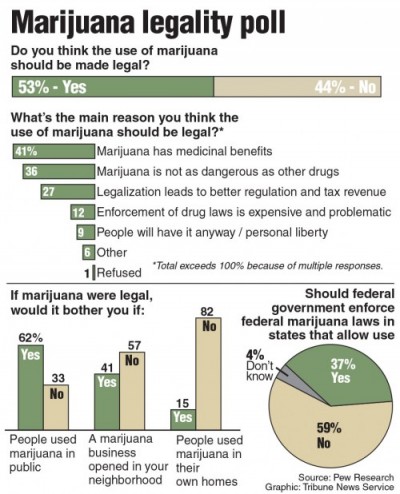
By AKBAR AMIN
Staff Writer
Over the past few months, many Ohio residents and pro-marijuana organizations have been eagerly promoting the legalization of recreational marijuana in their state. On November 3, the state held a vote to address the legalization of recreational marijuana, which was named Issue 3.
Issue 3’s description included a statement that “anyone 21 years or older with a license purchased from the Ohio Marijuana Control Commission, would have been able to use, possess, grow, cultivate and share up to eight ounces of homegrown marijuana and four flowering marijuana plants… and anyone 21 years or older (with or without a license) would have been able to purchase, possess, transport, use and share up to one ounce of marijuana,” according to Ballotpedia.org.
About 3,120,000 Ohio residents participated in the poll. Although the Issue was not passed, with 64.1% (2,006,341 residents) voting against and 35.9% (1,122,386 residents) voting for it, the results showed a source of support for marijuana legalization.
Both organizations and residents who feel that their rights are being violated led protests in response to these results.
The Ohio National Organization for the Reform of Marijuana Laws (NORML) claims on its website that “ending marijuana prohibition is not a partisan issue. Prohibition is a conservative issue, a liberal issue, a libertarian issue; it affects us all and crosses all political boundaries.” Ohio NORML is correct: politicians do not have the right to regulate what someone knowingly and willingly puts into his or her body.
If recreational marijuana were to be legalized, people who we currently call criminals would not have to illegally sell, obtain or use marijuana. When we arrest people for such offenses, it essentially eliminates their often valuable contributions to society. In many cases, these people’s reputations are irrevocably damaged, and, following their release, they can never contribute to society on the same level again.
People argue that marijuana harms the body and destroys lives; however, the same argument could be made for alcohol, which is legal in the United States. Furthermore, recreational marijuana is currently legal in four states: Alaska, Colorado, Oregon and Washington. None of these states have yet experienced excessive problems because of their policies allowing the use of recreational marijuana.
Recreational marijuana should be legalized, but with restrictions, just as Ohio proposed in Issue 3 and as the four states in which it is already legal mandate in their laws.
Drugs should be used carefully, and people should be educated about their benefits and detriments. According to Time, a 2012 study published in the Journal of the American Medical Association showed that low to moderate marijuana users actually experienced increased lung capacities compared to nonsmokers and that marijuana can even help repair lung damage caused by tobacco smoke. Other benefits of controlled marijuana use include pain relief and a decrease in anxiety.
It is clear that we must educate people about drugs, not hide from them. Politicians do not own our bodies, and they should not be able to regulate what we do with them.














